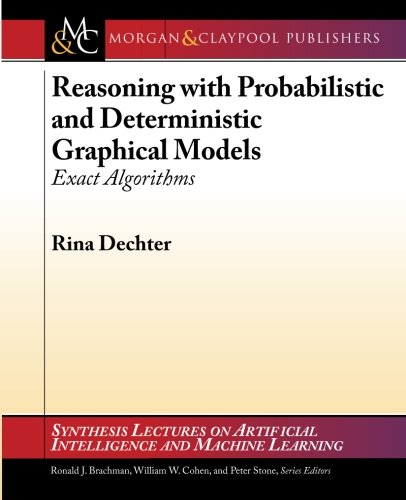Reasoning with Probabilistic and Deterministic Graphical Models: Exact Algorithms (Synthesis Lectures on Artificial Intelligence and Machine Learning, 23) - Softcover

Synopsis
Graphical models (e.g., Bayesian and constraint networks, influence diagrams, and Markov decision processes) have become a central paradigm for knowledge representation and reasoning in both artificial intelligence and computer science in general. These models are used to perform many reasoning tasks, such as scheduling, planning and learning, diagnosis and prediction, design, hardware and software verification, and bioinformatics. These problems can be stated as the formal tasks of constraint satisfaction and satisfiability, combinatorial optimization, and probabilistic inference. It is well known that the tasks are computationally hard, but research during the past three decades has yielded a variety of principles and techniques that significantly advanced the state of the art.
In this book we provide comprehensive coverage of the primary exact algorithms for reasoning with such models. The main feature exploited by the algorithms is the model's graph. We present inference-based, message-passing schemes (e.g., variable-elimination) and search-based, conditioning schemes (e.g., cycle-cutset conditioning and AND/OR search). Each class possesses distinguished characteristics and in particular has different time vs. space behavior. We emphasize the dependence of both schemes on few graph parameters such as the treewidth, cycle-cutset, and (the pseudo-tree) height. We believe the principles outlined here would serve well in moving forward to approximation and anytime-based schemes. The target audience of this book is researchers and students in the artificial intelligence and machine learning area, and beyond.
Table of Contents: Preface / Introduction / What are Graphical Models / Inference: Bucket Elimination for Deterministic Networks / Inference: Bucket Elimination for Probabilistic Networks / Tree-Clustering Schemes / AND/OR Search Spaces and Algorithms for Graphical Models / Combining Search and Inference: Trading Space for Time / Conclusion / Bibliography / Author's Biography
"synopsis" may belong to another edition of this title.
About the Author
Rina Dechter research centers on computational aspects of automated reasoning and knowledge representation including search, constraint processing, and probabilistic reasoning. She is a professor of computer science at the University of California, Irvine. She holds a Ph.D. from UCLA, an M.S. degree in applied mathematics from the Weizmann Institute, and a B.S. in mathematics and statistics from the Hebrew University in Jerusalem. She is an author of Constraint Processing published by Morgan Kaufmann (2003), has co-authored over 150 research papers, and has served on the editorial boards of: Artificial Intelligence, the Constraint Journal, Journal of Artificial Intelligence Research (JAIR), and Journal of Machine Learning Research (JMLR). She is a fellow of the American Association of Artificial Intelligence, was a Radcliffe Fellow 2005-2006, received the 2007 Association of Constraint Programming (ACP) Research Excellence Award, and she is a 2013 ACM Fellow. She has been Co-Editor-in-Chief of Artificial Intelligence since 2011. She is also co-editor with Hector Geffner and Joe Halpern of the book Heuristics, Probability and Causality: A Tribute to Judea Pearl, College Publications, 2010.
"About this title" may belong to another edition of this title.
Search results for Reasoning with Probabilistic and Deterministic Graphical...
Reasoning with Probabilistic and Deterministic Graphical Models: Exact Algorithms (Synthesis Lectures on Artificial Intelligence and Machine Learning, 23)
Seller: suffolkbooks, Center moriches, NY, U.S.A.
paperback. Condition: Very Good. Fast Shipping - Safe and Secure 7 days a week! Seller Inventory # 3TWOWA001LWG
Reasoning With Probabilistic and Deterministic Graphical Models: Exact Algorithms
Seller: Revaluation Books, Exeter, United Kingdom
Paperback. Condition: Brand New. 177 pages. 9.00x7.50x0.50 inches. In Stock. Seller Inventory # zk162705197X
Buy New
Ships from United Kingdom to U.S.A.
Quantity: 1 available
Reasoning with Probabilistic and Deterministic Graphical Models: Exact Algorithms (Synthesis Lectures on Artificial Intelligence and Machine Learning, 23)
Seller: GoldBooks, Denver, CO, U.S.A.
Condition: new. Seller Inventory # 14Y49_55_162705197X
Reasoning with Probabilistic and Deterministic Graphical Models: Exact Algorithms (Synthesis Lectures on Artificial Intelligence and Machine Learning, 23, Band 23)
Seller: Studibuch, Stuttgart, Germany
paperback. Condition: Gut. 192 Seiten; 9781627051972.3 Gewicht in Gramm: 500. Seller Inventory # 1063004
Buy Used
Ships from Germany to U.S.A.
Quantity: 1 available

